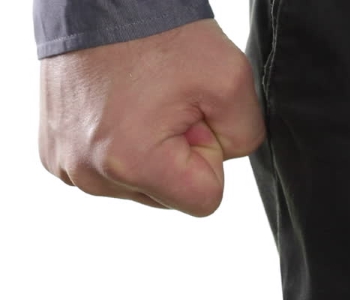
Lie: My body belongs to me.
Truth: Your body belongs to God.
It’s a common-enough assumption: ‘Hey, this is my body!’ After all, you may say, who else would it belong to? And furthermore, who else could do anything with it anyway? Yes, these are the bodies that we’ve been given, but that doesn’t mean they belong to us. We will one day leave this body — then whose body will it be? But let’s not get ahead of ourselves.
Our bodies are temporary shelters – temporary because they are mortal. One day we will certainly die. Paul described it this way:
For we know that if our earthly house, this tent, is destroyed, we have a building from God, a house not made with hands, eternal in the heavens. For in this we groan, earnestly desiring to be clothed with our habitation which is from heaven, if indeed, having been clothed, we shall not be found naked. For we who are in this tent groan, being burdened, not because we want to be unclothed, but further clothed, that mortality may be swallowed up by life. Now He who has prepared us for this very thing is God, who also has given us the Spirit as a guarantee. So we are always confident, knowing that while we are at home in the body we are absent from the Lord. For we walk by faith, not by sight. We are confident, yes, well pleased rather to be absent from the body and to be present with the Lord. — 2 Corinthians 5:1–8
Our body is something we inhabit. It is not me or at least it is not all of me. We should not presume its ownership simply by virtue of its possession. The body is separable from us, and the fact that it is severable means that we do not control it.
But why should it matter who owns our body?
It matters because the false assumption that ‘it’s my body’ tempts and mistakenly entitles us to use it however we want. But that simply is not true – we can’t use our body to steal or to lie or to rape, and get away with it for long. Doing so will degrade and jeopardize our body until it’s severed permanently from our soul.
Who owns you?
Ownership means ultimate accountability and sovereignty over something. An owner is no ‘middleman;’ an owner is not a manager or a steward or supervisor. The owner is the author, the originator. An owner is truly entitled to do whatever he wants with his creation. He may even choose to destroy it; but if he does it will be for good reason.

Let me ask you a question: Let’s say you came up with an invention — a great idea, and you put it down on paper, illustrating the parts and their interactions. You gather the materials and then actually build it, test it, debug it, make minor modifications, then put it into use and maintain it. Eventually you determine its serviceable life is over and you decide to decommission it. Who would you say this hypothetical invention belongs to? You the inventor of course! Now applying that analogy:
- Who designed you? God: “Let us make man in our image . . .” Genesis 1:26
- Who created you? God: “The Lord God formed man of the dust . . . ” Genesis 2:7
- Who maintains you? God: “ . . . upholding all things by the word of his power . . .” Hebrews 11:3
So who then do you, including your body, belong to?
In short, God himself.
But indeed, O man, who are you to reply against God? Will the thing formed say to him who formed it, ‘Why have you made me like this?’ Does not the potter have power over the clay, from the same lump to make one vessel for honor and another for dishonor?— Romans 9:20–21
Five reasons that God owns our bodies
1 We have little real responsibility or accountability for our bodies.
Yes, we steward our bodies: we eat, sleep, clean and move our bodies, but beyond that we have little responsibility. Most ‘maintenance’ is taken care of imperceptibly, ‘automatically’ – things like our bodily functions, our movements, our habits – they’re all orchestrated without any conscious thought. Simply by eating and sleeping and moving – all normally pleasurable and regular acts – we participate in a wildly intricate orchestration of ‘body maintenance.’ Yes we participate, but the most we can do is only indirectly influence our body.
Let me ask you another question: Do you really want the final say on your body – an organic masterpiece whose depths no one really knows? Actually, even if we wanted to, we could never really ‘take over.’ “I’ll take it from here” — no. We can only work with the body’s own magnificence. It, or God in it, does most of the work.
2 We had no say in the body we were given.
Then there are the unchangeable features, abilities and genetics that no one seems to be able to control: aging, looks, intelligence, aptitude. Our bodies are given. Most have whole bodies, but others are missing limbs, organs, etc. The fact that you had no say in it means that someone else is in control and whose purpose for this body is the one that truly matters.

3 Our body, in fact, our whole being, has been re-purchased – redeemed.
There’s another reason that God owns the rights to you, including your body: He has redeemed you — that is, he’s purchased you back to himself.
Now when He had taken the scroll, the four living creatures and the twenty-four elders fell down before the Lamb, each having a harp, and golden bowls full of incense, which are the prayers of the saints. And they sang a new song, saying:
“You are worthy to take the scroll,
And to open its seals;
For You were slain,
And have redeemed us to God by Your blood
Out of every tribe and tongue and people and nation,
And have made us kings and priests to our God;
And we shall reign on the earth.” — Revelation 5:8–10
4 Our body is intended to be a temple of the Holy Spirit.
Paul also clearly says that our body is a temple of the Holy Spirit:
Flee sexual immorality. Every sin that a man does is outside the body, but he who commits sexual immorality sins against his own body. Or do you not know that your body is the temple of the Holy Spirit who is in you, whom you have from God, and you are not your own? For you were bought at a price; therefore glorify God in your body and in your spirit, which are God’s. — I Corinthians 6:18–20
Yes, God ‘owns’ you, which of course includes your body. Yet he is no miser, no typical tyrannical slave owner; he’s actually very generous and allows us a wide latitude with what we do. And though you do not own your body (or yourself), you are its sole steward and he’s given it to you as a unique, valuable and powerful possession – no one else can claim your body or any part thereof.[1]
5 God jealously guards his own.
That said, our God is a jealous God – he is very possessive. Hear his words to Israel:
. . . you shall not bow down to them [carved images] nor serve them. For I, the Lord your God, am a jealous God, visiting the iniquity of the fathers upon the children to the third and fourth generations of those who hate Me, but showing mercy to thousands, to those who love Me and keep My commandments. — Exodus 20:5
For some reason we usually think of jealousy in a negative light, probably because we’ve all heard too many stories about jealous boyfriends who irrationally resort to violence over their girlfriend’s misplaced attentions. But here God is clearly jealous in a good way. But that’s because he truly is our only Creator, Savior, Defender and yes, our Owner. He’s jealous because he wants to protect us from the harm of other gods who maliciously seek to draw our affections away from him. See also the article, Lie: Idolatry is rare, part 1 and part 2.
So not only does God own our bodies – he owns all of us. He did not originally intend for the body to be separated from the spirit. Our spirit and our body are intertwined in ways we simply do not understand. This is why the death process is so painful, physically and emotionally. We do not want to leave the physical world and our loved ones who still inhabit their bodies. We cannot otherwise know, love, hear or touch them.
What to do with your body
In light of his mercy Paul urges us to offer our bodies as living sacrifices:
I beseech you therefore, brethren, by the mercies of God, that you present your bodies a living sacrifice, holy, acceptable to God, which is your reasonable service. And do not be conformed to this world, but be transformed by the renewing of your mind, that you may prove what is that good and acceptable and perfect will of God. — Romans 12:1–2
Paul beseeches us, pleads with us, to present our bodies as a living sacrifice. With this odd and apparently contradictory turn of phrase, Paul captures the essence of a healthy body outlook. This means that, though we live, we commit and dedicate our bodies on his altar of mercy, that in working out the life of the cross and of love, we resolve to die if necessary. See also the article, Lie: I am defeated, part 1 and part 2.
Our bodies are our last line of defense. We may be able to feign the death of our souls, but not the death of our bodies. Our bodies encapsulate our whole being and so this is the ultimate test of our discipleship: “ . . . proving what is that good and acceptable and perfect will of God.” (Romans 12:1–2).
We may say we want the will of God, and we may even sweat drops of blood in the process, but until we actually offer our bodies to the whip, the crown of thorns and finally, the cross itself, we have only a disembodied discipleship. These things may never actually happen, but God looks on the heart, our intent.

In this we come to a very deep truth – God owns us and there’s nothing we can do to change that. But realizing the miracle of life and breath and metabolism and the thousand processes that must go on flawlessly, we stand in awe of the only one who is capable and competent and worthy of it all. And so with our hands and eyes lifted to him we give thanks, for he truly is good.
I’m glad that my whole being, including my body, belongs to this God.
See also the introduction to this category: Lies attacking our self-understanding.
[1] Though we may choose to donate parts of it to others for organ transplant, but I’ll not deal with the wisdom, or lack thereof, in this article.